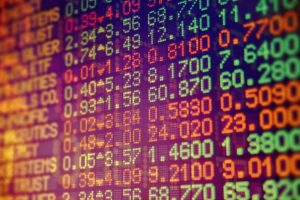 The classic Wall Street trader is dead. For decades, or even centuries, the professional investment markets were characterized by smart individuals buying and selling stocks, bonds, currencies, and commodities based on intuition, savvy valuation skills, and luck. Those days are gone. Trading on Wall Street today increasingly involves computers, algorithmic models, and Big Data. That is true not just in stocks, but across markets. This is fact that securities attorneys need to understand because it dramatically impacts how they should approach their jobs, and the mindset they should have with clients.
The classic Wall Street trader is dead. For decades, or even centuries, the professional investment markets were characterized by smart individuals buying and selling stocks, bonds, currencies, and commodities based on intuition, savvy valuation skills, and luck. Those days are gone. Trading on Wall Street today increasingly involves computers, algorithmic models, and Big Data. That is true not just in stocks, but across markets. This is fact that securities attorneys need to understand because it dramatically impacts how they should approach their jobs, and the mindset they should have with clients.
Many investors are aware that the old NYSE floor trading is a relic of a bygone era, but even at major banks, the people who work there are rarely traders themselves. Bloomberg recently profiled a top currency analyst, explaining that as recently as 2007, Goldman Sachs and other major firms traded in markets by having a skilled analyst shout trading directions whenever market-moving information like Weekly Jobless Claims were announced. Those days are gone, and that top analyst Bloomberg profiled is today focused on using Big Data to help clients develop better currency trading algorithms.
This changing market structure has dramatic implications for everyone on Wall Street, from traders and individual investors to those supporting Wall Street like accountants and attorneys.

How Filevine Helps In-House Legal Teams Manage Every Matter With Confidence
AI powers tools for data intake, document management, and drafting contracts.
Against this backdrop, individual investors need to decide how they want to move forward. There are only a few choices. In the commodities and energy space, for instance, most individual investors are not going to have the capital or ability to deploy high-speed trading algorithms. Instead, investors largely have to choose between using passive index funds like ETFs and paying for an advisory service or active mutual fund. Advisory services and active mutual funds face the same issue that traders at top Wall Street banks do of course, but they have the capital and capacity to build or buy their own algorithms and quantitative data models.
Dodd-Frank has hastened the shift from people-driven trading to machine-driven trading by forcing proprietary trading out of Wall Street banks, though it was a trend that was becoming clear even before the Dodd-Frank Act was enacted. For anyone involved with Wall Street – investors, advisors like attorneys, or even job seekers – it’s critical to understand these changes. Very few hedge funds are still picking investments on the basis of gut-feeling, intuition, or even a DCF model. Instead, the new Wall Street skill set includes Monte Carlo Simulation, GARCH models, and genetic algorithms.
Investors in all sectors should take this mindset to heart. While it is great if a company has a good story, investors need to look for other key criteria when making investment decisions these days. For instance, what do quantitative models say about the investment’s projected valuation versus its actual valuation? Are there any factors like a lack of liquidity that might distort the price temporarily and allow an attractive entry point? Is there long-term news about the firm that has not been adequately impounded into valuation yet? Is the company in a cyclical industry that will rise and fall predictably over time if an investor is patient?
All of these questions and more are considerations that should drive the new investment calculus. As successful hedge funds like Renaissance Technologies, AQR, and Bridgewater show, understanding the correlations that occur in markets and when those correlations will break down is perhaps the single most important driver of success over time. The classic Wall Street trader is dead. Long live the new Wall Street trader.

Stand With Survivors: Legal Tools To Make A Real Difference This DVAM
Enhance your legal skills to advocate for survivors of intimate partner violence.
Michael McDonald is an assistant professor of finance at Fairfield University in Connecticut. He holds a PhD in finance. Michael consults extensively with organizations ranging from Fortune 500 companies to start-up businesses on financial matters through Morning Investments Consulting. Michael has served as an expert witness in legal disputes, and is an arbitrator with the Financial Industry National Regulatory Authority (FINRA). Michael can be reached at [email protected].